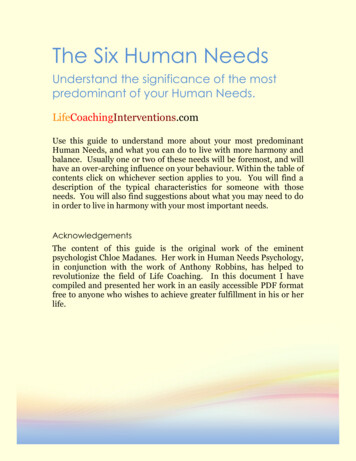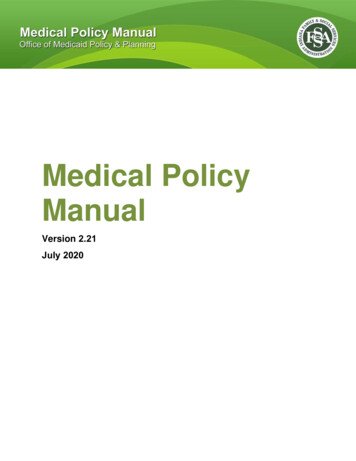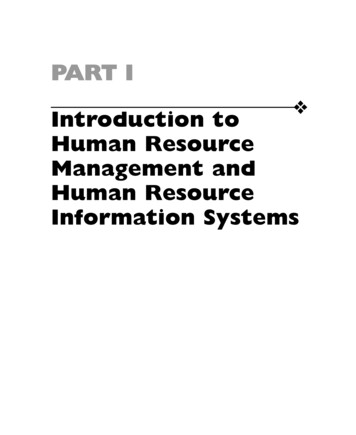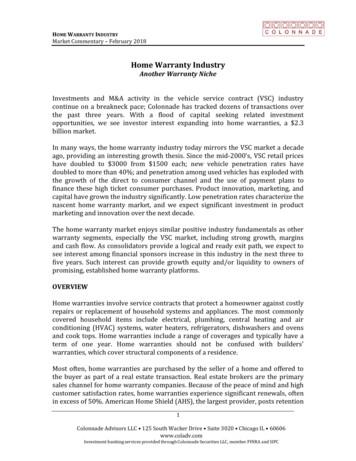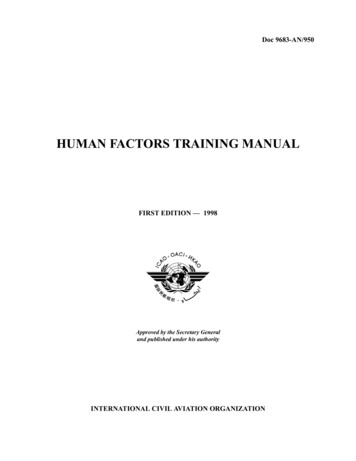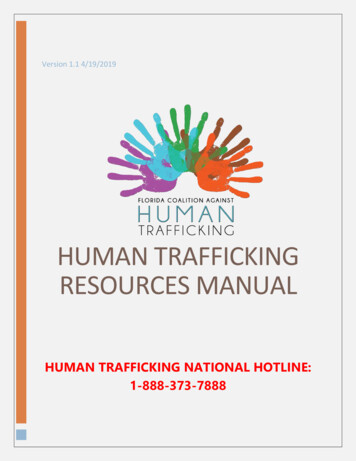
Transcription
1HUMAN SERVICES PROGRAM MANUALHUMAN SERVICES ASSOCIATE DEGREEALCOHOL AND DRUG ABUSE COUNSELING CERTIFICATECOMMUNITY SUPPORT HUMAN SERVICESPRACTITIONER CERTIFICATEDIRECT SUPPORT CERTIFICATENorthern Essex Community College100 Elliott StreetHaverhill, MA 01830Telephone: (978) 556-3000AY2017-2018
2DEDICATIONTHIS HUMAN SERVICE PROGRAM MANUAL IS DEDICATED TO THE GRADUATESOF THE PROGRAMS WHO HAVE BECOME MENTORS FOR PRESENT ANDFUTURE STUDENTS.GRADUATES OF THESE PROGRAMS SUPPORT STUDENTS WHO SEEK APROFESSIONAL CAREER IN THE FIELD OF HUMAN SERVICES AND MAY BEFOUND PROVIDING SERVICES IN AGENCIES THROUGHOUT MERRIMACKVALLEY.WE ALSO WISH TO RECOGNIZE THE WORK, DILIGENCE, AND COMMITMENTMADE BY PROFESSOR JANE GAGLIARDI WHO WORKED TIRELESSLY FORFOURTEEN YEARS AS PROGRAM COORDINATOR AND WHOSE LEADERSHIPAND STEADY GUIDANCE HELPED TO KEEP THIS PROGRAM A UNIQUE JEWEL INTHE NECC CROWN. WE WISH JANE A WELL-DESERVED RETIREMENT.FACULTYFaculty in the program aim to provide a positive learning experience for all students and support eachother to achieve the mission and goals of the programs and college.Brian MacKenna-Rice, LMHC, LADC I, Springfield College School of Human Services.Assistant Professor, Human Services Program, Northern Essex Community College. Extensive experienceas a therapist and educator, specializing in substance use disorders and recovery. Experienced in multiplemodalities and venues. Professor MacKenna-Rice is both a Licensed Drug and Alcohol Counselor andLicensed Mental Health Counselor in the Commonwealth of Massachusetts. Became Program Coordinatorin January, 2016.Jane Gagliardi, A.B., MSW, LICSW, HS-BCP, Vassar College, Boston CollegeGraduate School of Social Work. Professor and Past Program Coordinator of the Human ServicesProgram at Northern Essex Community College. Extensive experience as a clinical social worker, trainingdirector, consultant and supervisor. Professor Gagliardi is licensed as an Independent Clinical SocialWorker (LICSW) in Massachusetts and a Human Services Board Certified Practitioner (HS-BCP).Diana Mele, LMHC, A.A. Northern Essex Community College, B.A. Flagler College,M.A. Gallaudet University. Professor, Human Services Program and Deaf StudiesProgram. Extensive experience as both a Clinical Therapist as well as a Nationally Certified Interpreterworking within the Deaf Community. Professor Mele has licensure as both a Mental Health Counselor aswell as a Nationally Certified Interpreter of the Deaf.Donna Johnson, LICSW, Human Services Program Staff Associate; BA, Simmons College; MSW, HunterSchool of Social Work, City University of New York. Extensive experience in clinical social work, groupwork, program development, student and staff supervision, and human services, social work and publichealth management.
3TABLE OF CONTENTSDedication p. 2Preface-Northern Essex Community College p. 4Vision Statement, Mission Statement and Philosophy of Programs . p. 5College and Program Specific Policies and Program Responsibilities . p. 6-16Policies on:Health Examination .Liability InsuranceSubstance Use DisabilityAcceptance for Practicum PlacementTransportation to Practicum Driver’s License/Access to VehicleCORI, SORI, CHRIWithdrawal from PracticumCourse Registration/Course Selection .Transfer for CreditCredit for Life LearningRequired Statement on Plagiarism .Required Attendance Policies/Program Attendance Policies .Program Responsibilities: Coordinator/Faculty/Students/Agency Statement of Acceptance p. 6p. 7p. 8p. 10p. 10-11p. 11-14p. 15-16Human Services Practicum Overview and Expectations p. 17-37Practicum Course Objectives/Competencies . p. 17Practicum Placements . p. 18Process for Practicums p. 19Student Human Services Practice Guidelines . p. 20Practicum Agreement/Learning Contract . p. 21-22Practicum Learning Goals . p. 23-24Student Rights in Practicum Agencies . p. 25Orientation Checklist for Agency Supervisors . p. 26-27Guidelines for Students Supervision . p. 27-29Program Policy on Withdrawal from a Practicum Experience p. 29-31Policy for Practicum at Place of Employment . p. 32Log Recording Guidelines . p. 33-36Competencies/Skills for Substance Abuse Counselors . p. 37Matrix Charts: Relationships to HUS Courses and Competencies . p. 38-43Addendum: Advisory Committee . p. 44Advisory Committee Functions . p. 45National Organization for Human Services . p. 46Bibliography-References . p. 47
4HUMAN SERVICE ASSOCIATE DEGREE PROGRAMALCOHOL AND DRUG ABUSE COUNSELING CERTIFICATECOMMUNITY SUPPORT HUMAN SERVICE PRACTITIONER CERTIFICATE DIRECTSUPPORT CERTIFICATEPREFACE: This Program Manual has been developed to provide information to students,cooperating agencies in partnership with Northern Essex Community College, and agencysupervisors about the available program options: the Human Services Associate DegreeProgram, the Community Support Human Service Practitioner Program, the Direct SupportCertificate and the Alcohol Drug/Abuse Counseling Certificate Program. It will identify themission, philosophy and goals of the programs to prepare graduates with the competencies andskills, based on national standards, which are needed to deliver direct services to individualswithin the human service systems of care.The Program Manual describes the curriculums in each program and explains the rolesand responsibilities of the college faculty, agency partnerships, supervisor and student in thelearning contract for fieldwork experiences. It is a general guide which establishes theframework within which the human service students, the supervisor and faculty work together toprovide essential learning experiences and promote the profession of human services.NORTHERN ESSEX COMMUNITY COLLEGEThe College Catalog and the Academic Advising Handbook contain all the essentialinformation about the college and programs. The catalog is to be used in conjunction with theProgram Manual to gain a more comprehensive understanding of the college mission andpurpose in the community.Northern Essex Community College, an accredited public two year community college,offers 70 academic programs including associate degrees with career or transfer focus(sometimes both) and certificates preparing students in specific career fields. Cooperativeeducation, directed studies, high school equivalency (GED) preparation and testing as well asstudy abroad are available. Services include assessment and placement, advising, counseling,health services, childcare and academic support. Special services are available for students withdisabilities. NECC is architecturally barrier-free.The plan for education at Northern Essex is based on the premise that people in the MerrimackValley community have differing abilities, needs, desires and interests and that their educationalneeds vary as they continue through life. These educational needs must be met by a variety ofeducational programs. The Human Services Associates Degree Program, the Alcohol and DrugAbuse Counseling Certificate Program, the Community Support Human Service PractitionerCertificate and the Direct Support Certificate all aim to prepare individuals for positions in thehuman services field with competencies and skills needed for the 21st Century.Starting in the fall of 2014, any student enrolled in an associate degree program who is new toNECC and has no academic history at the college, must take at least one course designated asintensive in each of NECC’s six core academic skills in order to graduate. In most cases, theprogram’s core required courses include these intensive courses. Plan to see an advisor formore complete information about this graduation requirement.
5HUMAN SERVICE ASSOCIATE DEGREE PROGRAMALCOHOL AND DRUG ABUSE COUNSELING CERTIFICATECOMMUNITY SUPPORT HUMAN SERVICE PRACTITIONER CERTIFICATEDIRECT SUPPORT CERTIFICATEVISION STATEMENT:OUR VISION IS A PROGRAM CAPABLE OF INTEGRATING EXPERIENTIAL LEARNINGWITH ACADEMIC COURSEWORK GIVING GRADUATES THE OPPORTUNITY TOPURSUE A BROAD RANGE OF CAREERS AND/OR TO CONTINUE FURTHER STUDYAT A FOUR-YEAR COLLEGE.MISSION STATEMENT:OUR MISSION IS TO PREPARE BEGINNER PRACTITIONERS WITH THE VALUES,COMPETENCIES, ETHICS, AND PROFESSIONAL IDENTITY NEEDED TO DELIVERQUALITY CARE.PHILOSOPHYWe recognize and respect the uniqueness of each individual student.We support individual learning experiences for student’s personal and professional growth.We believe that education is a life-long process and assist students to achieve their highest potential.We believe that faculty are responsible for creating a supportive environment in the classroom wherebystudents can learn and transfer theory into practice.We promote an atmosphere of sharing and learning in the classroom and practicum experiences.We support the concept of student empowerment and choices in the learning process.We believe that individuals can change if we guide them with empathy, tolerance, patience, andunderstanding.We believe that emotional maturity is essential to effective practice as a human service professional.We respect the human rights of all individuals and promote cultural diversity.We respect the right to confidentiality and promote ethical practice in human services.We believe in an educational process that prepares graduates with competencies and skills that willtransfer to all human services settings.
6HUMAN SERVICES ASSOCIATE DEGREE PROGRAMANDCERTIFICATE PROGRAMSALCOHOL AND DRUG ABUSE COUNSELING PROGRAMCOMMUNITY SUPPORT HUMAN SERVICE PRACTITIONER PROGRAMDIRECT SUPPORT CERTIFICATEThe Human Service Associate Degree Program, Community Support Human ServicePractitioner Certificate Program, Direct Support Certificate and the Alcohol/Drug AbuseCounseling Certificate Program all follow the general policies of the college as outlinedin the College Catalog and Students’ Rights and Responsibilities: A Code of Conduct.All four programs follow the general policies of Northern Essex as identified in thecollege catalog in relation to admission requirements, tuition and fees, financial aid,transfer credit, counseling and advising, and academic standards.PROGRAM POLICY ON HEALTH EXAMINATION: All students are required tocomplete a health examination and immunizations, prior to final acceptance to theprogram. All students must have a completed health examination and requiredimmunizations for practicum placement. Upon acceptance to the program, studentsreceive a health packet from Enrollment Services of the College and return thecompleted information. Students desiring a career in Human Services must bephysically and emotionally capable of assuming responsibility for direct care/communitysupport services with clients. The physician must note that a student is able to enter intoa practicum/work experience. If a health issue arises, the student will be contacted todetermine if the practicum experience requirements for the program cannot be met.Without the practicum experiences, the student cannot graduate from the program. SeeHEALTH REQUIREMENTS PACKET.PROGRAM POLICY ON LIABILITY INSURANCE: All students in the program arerequired to have liability insurance, which is taken out at the time of registration as astudent fee, and prior to practicum placement.PROGRAM POLICY REGARDING SUBSTANCE ABUSE DISABILITY: Students whoexperience a substance abuse disability, are required to meet the accepted guidelinesfor recovery based on standard practice. Program requirements are a minimum of oneyear for class content and two years for practicum. Students, who relapse, need to beresponsible for their own behavior and appropriately cope with the relapse.PROGRAM POLICY ON ACCEPTANCE FOR PRACTICUM PLACEMENT: Studentsmay request experience in a specific practicum agency. However, final decisionregarding placements of students remains with the Program Coordinator or ProgramStaff Associate. Students are interviewed by the Human Service/practicum agency.The practicum agency has the final decision on acceptance of the student intopracticum. See the Process for Practicum Guidelines in this Human ServiceProgram Manual.
7PROGRAM POLICY ON TRANSPORTATION TO PRACTICUM: Students areresponsible for transportation to and from practicum agencies. Students are responsiblefor transportation to and from any site visits associated with courses in the HumanService curriculum.PROGRAM POLICY ON DRIVERS LICENSE/CAR ACCESS: Students areresponsible for being able to participate in a practicum experience. In addition toother factors, this requires a sufficiently flexible schedule to allow for agency schedulingand no more than a one-hour commute to an agency. Students who request practicumplacements in an agency near their home only because they cannot get anywhere else,due to lack of a driver’s license or car, hinder the practicum experience. A choice ofpracticum experiences needs to be based on providing a wide range of learningopportunities rather than geography. The program aims to accommodate students whodo not have a license or car whenever possible and locates practicum experiences thatare accessible to the student. However, the program cannot guarantee placement forany student with such limitations on transportation.In the Human Service industry, students are also made aware that having a valid driver’slicense, a good driving record, and car are conditions of employment in many areas ofthe Human Service industry. The trend is for staff to accompany clients for services inthe community, to take clients into the community for social integrations, to follow upclients at job sites, and to provide supportive services in a client’s residence inindependent living situations.PROGRAM POLICY ON CORI/SORI/CHRI CHECKS FOR PRACTICUMPLACEMENT:Students interested in participating in this academic program will be required to undergoa Criminal Offender Record Information (CORI) and/or Sex Offender Record Information(SORI) check and/or Criminal Records Central Repository check (CHRI). NorthernEssex Community College is committed to the success of every student. Students withlegal issues in their background will meet with a committee as part of theCORI/SORI/CHRI process and will receive guidance and counseling throughout thereview of their records. NECC personnel make every effort to help students prepare forcareers in their chosen field. Students are encouraged to seek assistance and support.PROGRAM POLICY ON WITHDRAWAL FROM PRACTICUM: The College Programfollows the policies contained in the Students’ Rights and Responsibilities: Code ofConduct. The Program has a policy on withdrawal from practicum experience asappropriate to the situation. See pages 46-47 for further information.
8PROGRAM POLICY ON COURSE REGISTRATION/COURSE SELECTION: Facultyand the Program Staff Associate in the Human Service Program serve as academicadvisors. Students are requested to follow the recommended course sequencesoutlined for the programs. Credits earned in the Certificate Programs may be appliedtoward the Associate Degree in Human Services. Students are expected to follow theplanned curriculum sequence if they continue toward the Associate Degree. It is theresponsibility of the student to be knowledgeable regarding the sequence of courses andto plan their schedule accordingly. Students are strongly encouraged to meet with theiradvisors early to mid-semester to plan out an academic schedule at least 1-2 semestersahead.PROGRAM POLICY ON TRANSFER CREDITTransfer credit may be awarded for a course earned with a grade of C or better atanother accredited institution when the course is equivalent to one offered by the collegeand is applicable to the Northern Essex curriculum in which the student is enrolled.Credits earned at other than accredited institutions will be evaluated on an individualbasis. Academic Advising evaluates all credit from other institutions. (See the Collegecatalogue for more information on transfer credit). The ProgramCoordinator also reviews the student’s credits from another institution for transfer creditpurposes and makes recommendations of transfer credit as appropriate.PROGRAM POLICY ON CREDIT FOR LIFE LEARNINGThe College program follows the policies of the college for credit for life learning. Thecredit for life learning policy provides opportunity to award college credit to students whodemonstrate that their knowledge and skills are equivalent to those gained in a course orcourses offered by the college. The College catalogue contains information on credit forlife learning. The process for obtaining credit for life learning is individualized and mayinclude a challenge examination, one or more personal interviews, preparation of aportfolio, and other evidence that students know those things, or possess the skills,offered in a course for which Northern Essex Community College grants credit. Whenthe general requirements (and those requirements of the particular department involvedin the process) are completed, a decision concerning the awarding of credits for lifelearning will be forwarded to the students and to the Registrar’s Office by the Committeeon Credit for Life Learning. The Registrar will enter the credit awarded on the student’spermanent record indicating that the credit has been awarded and that it has beenearned by the Credit for Life Learning process. See the Credit for Life LearningApplication.The Human Services Program has established criteria for those students wishing tosubmit a portfolio to receive credit for life experience for a practicum. Academic credit isbased upon demonstrated knowledge and skills, not only attendance. Therefore,documented work experience and attendance at workshops are not sufficientdemonstration of knowledge and skills. Students may be approved to receive credit forlife experience for a practicum if they can demonstrate that they have met all of thefollowing criteria:
91. They have completed a supervised clinical placement at a human services agencyand received undergraduate or graduate academic credit for that work (e.g. thestudent has received a B.A. in social work and is returning to complete theirAlcohol/Drug Abuse Counseling Certificate) and a grade of “C” or better.2. IF that supervised clinical placement (see #1) is addressing a different clientpopulation and needs than those appropriate to the particular practicum, thestudent may alternately provide documentation (written) of employmentexperience comparable to the practicum in terms of hours of experience andspecialty (e.g. an agency focusing primarily on substance abuse treatment). Forexample, if a student has completed a clinical placement or internship of at least180 hours on an inpatient adult psychiatric unit and received a satisfactory gradeand has also been employed at a residential program for adults in early recovery,they would have met the conditions of #1 and #2 for the Alcohol/Drug AbuseCounseling Certificate.3. The student completes a written case presentation that satisfies the requirementsof that practicum (HUS190, 191, 192, or 291 as relevant).4. The student demonstrates understanding of the Community Support SkillStandards (or the Core Functions of Addiction Specialists if the student wishes topursue credit for HUS191 or HUS192).This statement applies to all courses with the HUS prefix. These courses a
other to achieve the mission and goals of the programs and college. Brian MacKenna-Rice, LMHC, LADC I, Springfield College School of Human Services. Assistant Professor, Human Services Program, Northern Essex Community College. Extensive experience as a therapist and educat

